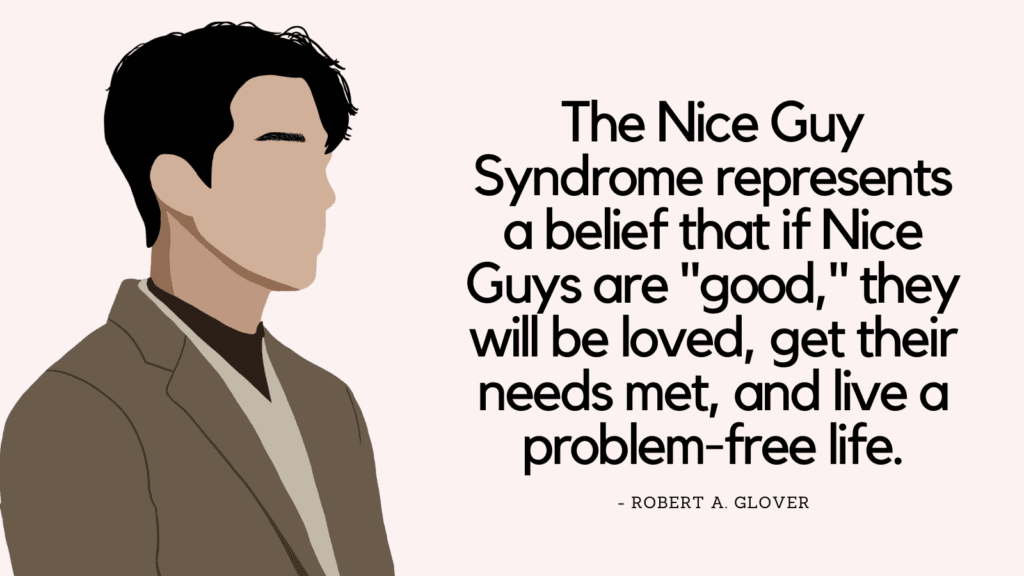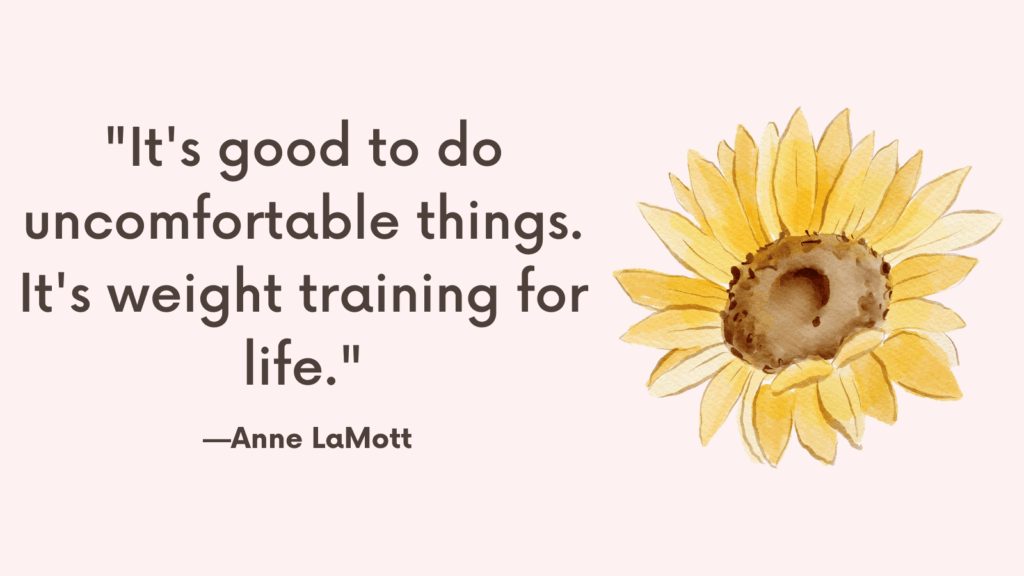This post contains Nice Guy syndrome test and practical ways to stop seeking approval and start getting what you want in love and life.
And if you’re a woman, this post can help you better understand and help your Nice Guy partner.
- What Is Nice Guy Syndrome?
- Nice Guy Syndrome Test: Do I Have Nice Guy Syndrome?
- Why Nice Guys Suck?
- What Causes Nice Guy Syndrome?
- How to Stop Being a Nice Guy?
- Step 1. Learn To Please The Only Person Who Really Matters
- Step 2. Make Your Needs A Priority
- Step 3. Reclaim Your Personal Power
- Step 4. Get The Love You Want
- Step 5. Get The Life You Want
- Conclusion
What Is Nice Guy Syndrome?
The nice guy syndrome is a term used to describe a man who puts the needs of others before his own, avoids conflict and tries to stay out of trouble, and provides emotional support and favors.
Although these men view themselves as “nice guys,” their “nice deeds” are in reality only motivated by attempts to get love and fulfillment in return.
Nice Guy Syndrome Test: Do I Have Nice Guy Syndrome?
While everyone is unique Nice Guys usually share some common characteristics. The following questions represent common signs of Nice Guy Syndrome:
Results
#1. Do you strongly believe that your generosity is what will make others love you?
#2. Do you frequently, and usually without being asked, attempt to solve others’ problems and fulfill their needs?
#3. Do you always seek validation from others?
#4. Do you often go to great lengths to avoid conflicts and avoid upsetting anyone?
#5. Are you often afraid others might shame you or abandon you if some of your mistakes are exposed?
#6. Do you usually find it difficult to make your needs a priority (e.g. you believe it’s selfish to put your needs first, or you believe that making others’ needs a priority is a virtue.)?
#7. Do you make your partner your emotional centre, believing that if you can make them happy, you’ll become happy, too?
We will not sell your information. All results are kept confidential.
This quiz is for informational purposes only. It is not meant as a diagnostic or assessment tool.
Results
The questions above represent common signs of Nice Guy Syndrome. If you answered yes to most of these questions, then you may have issues related to Nice Guy Syndrome.
Why Nice Guys Suck?
People tend to minimize the problem of being a Nice Guy.
Nice Guys themselves have a difficult time understanding the seriousness of their beliefs.
In fact, Nice Guys are often anything but nice. The following are some of the Not-so-nice traits of Nice Guys:
1. They are dishonest.
Nice Guys work hard to avoid conflicts, hide their mistakes and shortcomings, conform to what they think others expect from them, repress their feelings… these things make Nice Guys dishonest.
2. They are manipulative.
Nice Guys struggle to make their needs a priority and find it difficult to ask for what they need in clear, direct ways. Therefore, they often try to get their needs met by manipulating others.
3. They give to get.
Nice Guys tend to give with unconscious and unspoken strings attached. They usually want some kind of reciprocation whether it was being appreciated, or wanting someone to stop being angry at them, etc. When they get little in return, Nice Guys end up feeling frustrated and resentful.
4. They are passive-aggressive.
Nice Guys tend to express feelings of resentment and frustration in indirect and not-so-nice ways. This includes becoming unavailable, forgetting, being late, and repeating the same annoying behavior even when they promised not to.
What Causes Nice Guy Syndrome?
There are many reasons why we might feel the need to please other people in our life.
1. Fear
Some people fear having conflicts in their lives.
They feel that if they can please others, there will be no conflicts and everything will be okay.
They might also fear rejection or abandonment. They would think to themselves that if they can’t make someone happy, then he won’t like them. They thrive on praise and need constant reassurance from others.
So they keep changing their behavior in an attempt to please others and make them happy.
2. Childhood experiences
The desire to please others might stem from childhood experiences.
Children of alcoholics, for example, are likely going to grow up to be people pleasers. They’ve learned early on that the best way to deal with a parent’s unpredictable behavior, was to please them.
In other cases, the child learns that the only way to get his parents’ attention is by doing good deeds and getting good grades.
3. Self-worth
Pleasing people can be a source of self-worth for some.
They figure out that if they can make others happy, then they must be worth something.
It’s their way to feel needed and important.
4. The Role of Trauma
When we think of trauma, most of us think of extremely painful events like abuse, extreme neglect, or great and unexpected loss.
However, trauma can also result from small, painful incidents repeated over many years, especially during childhood.
When the child’s emotional (and sometimes physical) needs were repeatedly ignored in favor of those of adults, he may grow up to become a people pleaser.
5. The Need to Belong
Our need to belong, to be loved, and to be liked are some of the most powerful human drives.
According to the hierarchy of needs proposed in 1943, by psychologist Abraham Maslow, our need to belong and to be loved sits right above our need for safety and our most basic physiological needs.
This strong need may push us to do almost anything to fulfill it, including sacrificing our freedom and living by damaging lies and principles.
6. Seeking Emotional Safety
Believing that we are not inherently lovable or valuable causes us to feel emotionally unsafe.
We believe that showing our authentic self is risky and dangerous.
This belief was reinforced each time we were judged or rejected or told to change.
We not only hide our authentic self, but we also start creating a false self (what we believed others wanted) in the hope of feeling safe and accepted.
However, we never actually manage to feel safe, because we keep living in fear of being found out and rejected for good.
Paradoxically, actual emotional safety happens only when we live out of our authentic self, learn how to love ourselves, and trust our own ability to take care of ourselves emotionally. Emotional safety is something we learn to create it for ourselves.
Related: Building Intimacy: How to Stop Self-Sabotage and Improve Intimacy In Your Relationship?
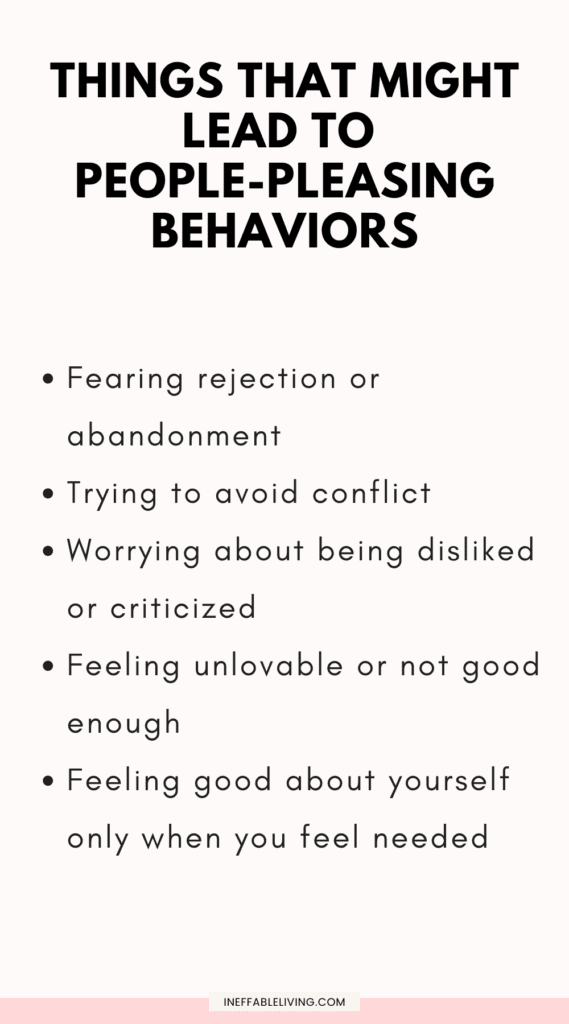
How to Stop Being a Nice Guy?
Step 1. Learn To Please The Only Person Who Really Matters
In an attempt to please people around them, Nice Guys will become whatever they believe a person wants them to be.
With their smart friends, they’ll act intelligently and use big vocabulary. Around their mothers, they’ll look like the perfect loving son. With their fathers, they’ll talk about sports. With their cool friends, they’ll cuss and swear and do whatever to look cool.
But underneath it all, they’re not even sure who they are, or if other people would like them the way they are.
They’re afraid they’ll be alone even though they feel alone anyway.
Nice Guys are constantly seeking external validation even from strangers they don’t like.
However, by working hard to please everyone, Nice Guys end up pleasing no one, including themselves.
Things like being smart, looking unselfish, staying sober, being in good shape, never getting angry, making other people happy, dressing well, looking like a good father, etc… are value-seeking mechanisms.
Nice Guys attach their value and worth to these things and use them to convince themselves and others that they’re valuable.
Without these attachments, they don’t know what else would make others love them.
Recovering Nice Guys must begin seeking the approval of the only person who really matters, and that’s themselves.
Only when they start focusing on pleasing themselves, that Nice Guys can begin to experience the intimacy and connection that have always wanted.
To facilitate this recovery, you should do the following:
#1. Identify how you seek approval
Atart paying attention when you’re trying to impress or get approval.
A Nice Guy can find himself spending extra time fixing their outfit, cleaning the kitchen, staying later at work – just to get praised or noticed.
After identifying these approval-seeking mechanisms, set a period of time to stop doing it, and instead, turn inward for validation.
Ask yourself: what do they want? what feels right to them? and what would make them happy? and begin doing more of it.
Related: Raising low self-esteem: 18 Ways to Build High Self-Esteem
#2. Take good care of yourself
Taking good care of the self is a powerful tool to change Nice Guys’ beliefs when it comes to how worthy they are.
By consciously doing good things for yourself, you begin to believe that you must be worth something.
These good things can be things as simple as drinking more water, going for a walk, working out, eating healthy food, getting enough sleep, getting a massage, buying a new pair of shoes…And they can be more extensive things like buying the car they always wanted or going on a vacation.
Doing good things for yourself might lead to feeling uncomfortable, anxious, frightened, or even guilty.
But these feelings should cease as their behavior begins to change your deeply held beliefs that you’re worthless, and replace it with more accurate beliefs that reflect your inherent worth.
#3. Use positive affirmations
Positive affirmations can replace old, inaccurate beliefs about the Nice Guy’s worth with new, more accurate ones.
These affirmations should be used along with the change of behavior in order for them to effectively change the Nice Guy’s core belief about himself.
The following are some examples of positive affirmations:
- “I am desirable just as I am”
- “People love me and accept me just as I am”
- “My needs are important”
- “I am the only person I have to please”
#4. Spend extended periods of time alone
By spending an extended period of time alone, you can discover who you are and what you want. You can reflect on yourself and your life direction.
Moreover, spending an extended period of time alone helps you face your fear of loneliness and isolation.
You’ll discover that spending time alone won’t kill them, which can lead them to decide that you don’t have to stay in bad relationships or manipulate people in order to get his needs met.
To make the best use of this time alone, you can take trips or retreats by yourself to places where no one knows them. That way you’ll feel less tempted to please people and hide your mistakes.
During this time you can start doing what you want and practice living by your own rules. You can start taking good care of yourself and reflect on your life.
Related: How To Be Happy Alone In Life: 6 Proven Ways To Start Enjoying Being Alone
#5. Allow yourself to be vulnerable with safe people
When Nice Guys attempt to hide and cover up their mistakes, they’re reinforcing their core belief that they are bad and unlovable.
Changing this deep-held belief requires that you open up about your humanity and release your toxic shame.
This requires a safe person, someone, or a group you can trust and reveal yourself to. Once trust has been established, begin by talking about yourself and reveal things that are a source of fear and shame for them.
As you begin to seek your own approval, you begin to realize that you don’t have to do anything or hide any flaw or mistake to win other people’s approval and that you are loved just as you are.
Related: 10 Signs of Toxic Shame — and How to Overcome Toxic Shame?
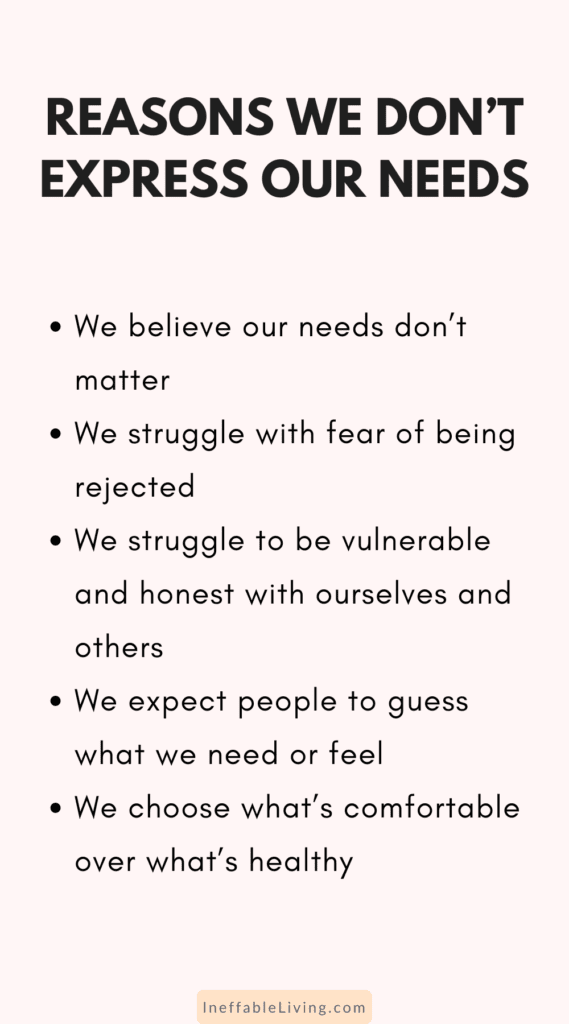
Step 2. Make Your Needs A Priority
Nice Guys believe in the myth that if they give up themselves and put others first, they’ll be loved and they’ll get their needs met.
This is usually a result of childhood conditioning.
When a child’s needs are not met in a healthy manner, the child might believe that he is “bad” for having needs or that it’s his needs that cause people to hurt him and abandon him.
As a result, Nice Guys try to appear needless and focus instead on other people’s needs.
However, Nice Guys cannot totally repress their needs and cannot meet their needs on their own.
Consequently, you try to appear to be needless while trying to get your needs met in indirect, manipulative, and controlling ways.
Nice Guys are also terrible receivers. They are extremely uncomfortable getting your needs met and will go to great lengths to make sure you don’t.
To help get your needs met, start taking responsibility for your own needs.
#5. Take responsibility for your own needs
In order to get your needs met, you need to replace your deep-held beliefs with the following beliefs:
• Having needs is part of being human.
• Mature people make meeting their own needs a priority.
• You can ask for help in meeting your needs in clear and direct ways.
• This world is a place of abundance.
To help strengthen these new beliefs, you need to change your behavior too. You need to start putting yourself first and make your needs a priority.
By doing this, you not only ensure your needs are met, but people around you benefit too.
There will be no indirect, controlling ways to ask for something, no anger outbursts, and no passive-aggressive behavior.
Related: Learning to Receive: How to Receive More In Life Using These 9 Practical Techniques?
Step 3. Reclaim Your Personal Power
Nice Guys tend to sacrifice their personal power and become victims.
In fact, in childhood, these Guys were helpless to prevent people from neglecting them, abandoning them, abusing them, or smothering them.
They were victims of the people who failed to love them and meet your needs.
As a result, Nice Guys tend to see others as the ones responsible for their problems.
This makes them live frustrated and resentful.
The myth that Nice Guys believe and that promises that “If you are good, then you’ll be loved, get your needs met, and have a problem-free life.” does only the opposite and guarantees feelings of perpetual powerlessness.
Even though Nice Guys work hard to create a problem-free life, two major factors prevent them from living this kind of life.
* The first is that life is never problem-free, it’s filled with unpredictable experiences that are beyond anyone’s control.
* The second reason is that Nice Guys do the opposite of what works.
You’re using coping mechanisms you’ve developed during childhood when you were powerless and naïve such as doing it right, being charming and helpful, never cause a problem to anyone, repressing feelings, avoiding problems, and difficult situations.
And the more unsuccessful these mechanisms turn out, the more frightened you become.

#6. Surrender: Accept what you can’t control
Surrendering in order to reclaim your personal power might sound counterintuitive, but surrendering here means to let go of what one can’t change, in order to be able to change what you can.
Surrendering allows you to embrace life experiences and see them as a “gift” to grow as an individual.
So instead of asking “Why is this happening to me?” to life challenges by pondering, “What can I learn from this experience?”
#7. Accept reality
To control their world and make sure it remains problem-free, Nice Guys create belief systems about people and situations that are far from reality. Then they act as if you were accurate.
By stepping back from the situation and accepting the reality of the situation, you will be able to change your response to it and stop projecting the reality you want to believe in it.
Related: Overcome Suffering In Your Own Way: 4 Keys To Relieve Suffering
#8. Get in touch with your feelings
Feelings make Nice Guys terrified and feel out of control.
In fact, in childhood, feelings caused either negative attention or no attention at all.
As a result, you felt safer when you eliminated any emotion that might cause them to feel abandoned.
Feelings of anxiety, helplessness, shame, loneliness, or sadness aren’t life-threatening and aren’t a sign of softness – You are an integral part of human existence.
Men who are in touch with your feelings are more powerful and assertive.
Get more in touch with his feelings, by taking responsibility for what you’re feeling.
So instead of focusing on the other person, “You are making me sad,” you should focus on the way he’s feeling: “I am feeling sad.”
Related: Regulate Your Emotions: How To Manage and Control Your Difficult Emotions?
#9. Face your fears
While fear is a normal feeling that warns us when danger may be approaching, for Nice Guys, fear is a memory of every seemingly life-threatening experience they ever had.
It’s caused by not having your needs met in a timely, healthy manner, and heightened by the unknown that comes with any kind of change in life.
To cope with this reality, Nice Guys play it safe.
However, because you avoid new situations, stick with the familiar, procrastinate and fail to finish what you start, and keep doing more of what never worked in the past, you’re creating a lot of needless suffering.
When you convince yourself that you should feel the fear but do it anyway and that whatever happens, you can handle it, only then can you find the courage to stop suffering and start enjoying your life.
Related: Dealing With Avoidance: How to Calculate Risks And Overcome Fear In Life?
#10. Cultivate integrity
In order to make their life problem-free, Nice Guys would tell a lie or withhold the truth, all while tricking themselves into believing that they’re being honest, like saying “I didn’t lie, I just didn’t tell everything.”
In reality, your dishonesty is fear-based behavior that is robbing you of your personal power. When you start paying attention to the things you least want to reveal, you can practice telling the truth.
Sometimes you have to practice telling a certain truth several times before all of the pieces of information get told. Being honest might not be the answer to leading a problem-free life, but living a life of integrity is much easier than living one built around distortion.
#11. Set healthy emotional boundaries
Learning to set healthy boundaries allows you to stop feeling like a victim and reclaim your personal power.
Boundary setting isn’t about changing others, but about changing yourself. When someone crosses your boundary, it isn’t the other person’s fault, it’s yours.
When you begin to take responsibility for how you let others treat them, your behavior starts to change.
Surprisingly, this helps your relationships with others survive and grow.
As you begin to surrender, dwell in reality, express your feelings, face your fears, develop integrity, and set boundaries, you reclaim your personal power and start getting more of what you want in life and love.
Related: Defining Boundaries: 25 Effective Ways to Set Healthy Emotional Boundaries?
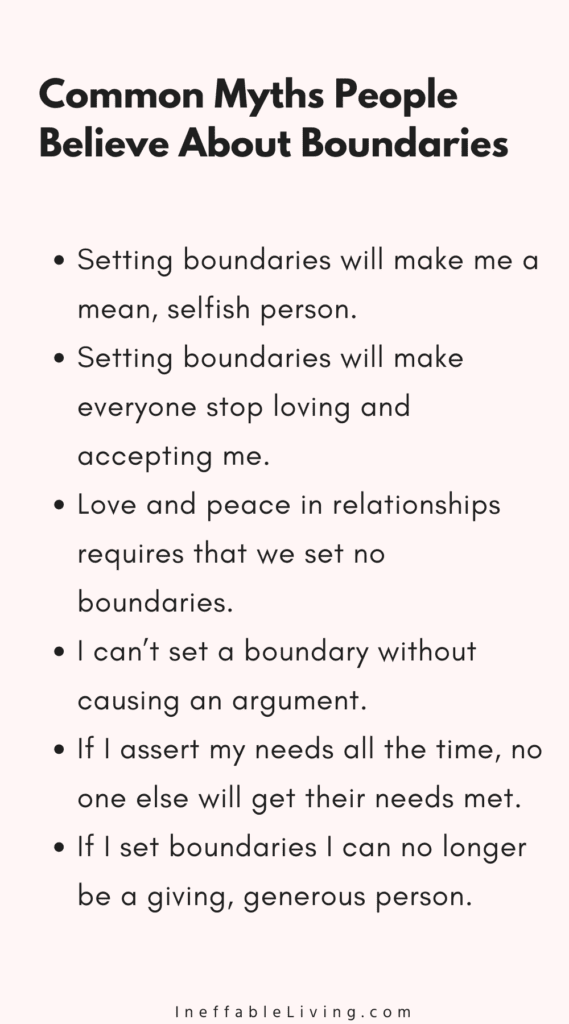
Step 4. Get The Love You Want
Intimate relationships are often an area of frustration and bewilderment for Nice Guys.
Even though they strongly desire intimacy and happiness with their partner, their core beliefs, and childhood survival mechanisms make such a connection difficult.
While there are no perfect relationships or partners, you get the love you want by doing the following:
#12. Approve of yourself
When you start living your life just as you desire without trying to get anyone’s approval, the people who like them just as you are will hang around.
The people who don’t, won’t. and this is the only way to have a healthy relationship.
Related: Love Yourself: What Is Self-Love & How to Start Loving Yourself?
#13. Set boundaries in your intimate relationships
Setting healthy boundaries with your partners creates situations in which both partners can feel safe to be vulnerable and experience true intimacy.
When you set boundaries, your partner will feel secure and loved. She’ll come to know that if you will stand up to her, you’re also likely to stand up for her.
However, when you fail to set healthy boundaries, it communicates to your partner that you don’t honor yourself so why should she?
Related: How to Set Boundaries? 5 Steps to Establish Healthy Emotional Boundaries
#14. Don’t reinforce undesirable behaviors
Because Nice Guys believe in the idea of leading a problem-free life and relationship, whenever their partner is unhappy, angry, or having a problem, they’ll jump right in and try to fix it.
Unfortunately, by responding or paying attention to the behavior you would like to eliminate, you’re actually reinforcing it, increasing the likelihood that that behavior will occur again.
If his partner always comes home from work with a problem, the recovering Nice Guy needs not ask about it and let his partner figure a solution on her own.
Surprisingly, he’ll notice that his partner doesn’t come home from work angry anymore.
#15. Seek healthy partners
For single Nice Guys, doing something means choosing a different kind of partner. Someone who is healthy and independent, and who is taking responsibility for her own life.
When you create a relationship with someone who doesn’t need fixing, you improve your odds at finding the love you want.
By putting yourself in the position to embrace relationships’ challenges, you can have fulfilling, intimate relationships and get the love you want.

Step 5. Get The Life You Want
While Nice Guys tend to be intelligent, industrious, and competent individuals, the majority are not living up to their full abilities and potential.
They haven’t created the kind of life they desire. Nice Guys spend so much of their time and energy seeking approval, hiding their flaws and shortcomings, playing it safe and avoiding conflicts, and in general doing the opposite of what works.
Since Nice Guys, usually, have dysfunctional intimate relationships, these relationships problems often overshadow the fact that they’re equally dissatisfied with their job, career, and life in general.
To get the life you want, you can do the following:
#16. Face your fears
Whether it was demanding the raise you deserve and have been promised, going back to school to get the education you need to pursue a fulfilling career, quitting the job you despise, starting the business of your dreams… when you remind yourself that no matter what happens, you’ll hand it, you’ll be able to take more chances and achieve more in life.
Related: 7 Symptoms of Avoidant Personality Disorder (AvPD) – & How To Overcome Avoidance
#17. Live by your own rules
Nice Guys, often, end up accepting where they are and act as if they have little power in shaping their lives.
They’re simply aren’t taking responsibility for creating the kind of life they want.
When you take charge of his life and make a conscious decision to face your fears, not settle for mediocrity and make your own rules, you find ways to create an interesting, productive, and passionate life.
#18. Identify self-sabotaging behaviors
Make the conscious decisions to get out of your own way and stop sabotaging your life.
When you become aware of the different ways you’re creating barriers for your success and keeping yourself stuck – by wasting your time, procrastinating, making excuses, not finishing what you’ve started, caretaking other people, having too many projects going at once, getting involved in toxic relationships, not setting healthy boundaries, and so on- only then can you make the necessary changes toward the life you want.
Related: Stop Self-Sabotage: How to Tame Your Inner Teenager and Heal Your Inner Child?
#19. Develop a more accurate view of the world
Because of their deprivation thinking, Nice Guys have a difficult time grasping the idea that life is abundant and ever-expanding.
When you begin to see the world as a place of abundance and realize that there is plenty to go around, then you become ready to receive what you want.
Breaking free from the distorted beliefs of the Nice Guy will allow you to discover your true passion and potential and take responsibility for creating the kind of life you really want.
Conclusion
It can be difficult to find a balance between being kind and assertive, especially when you have been conditioned to prioritize the needs of others over your own.
However, it is essential to recognize that being too nice can often lead to disappointment and unfulfilled expectations.
It is important to learn to set boundaries and communicate your needs clearly and directly.
This does not mean you have to be rude or aggressive, but rather assertive and confident in your actions and decisions.
It may take some practice and self-reflection, but with time, you can overcome the “nice guy” syndrome and become a more empowered.
Resources
- Nice guy – Wikipedia
- The sinister logic behind ‘Nice Guy Syndrome’, explained by psychologists | The Independent | The Independent
- Dating preferences of university women: an analysis of the nice guy stereotype – PubMed (nih.gov)
